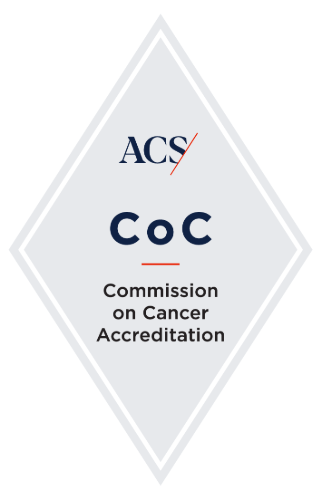Blood and bone cancers include leukemia, lymphoma, multiple myeloma, and sarcomas, affecting blood, lymphatic, and bone tissues.
Focused on you
At Corewell Health, we take a coordinated approach to cancer care, making the journey as seamless as possible. With virtual care options and more than a dozen cancer centers across Michigan, we bring together the expertise of thousands of specialists, increasing access when you need it most. We become more than oncologists and specialists. We become second families.
Our cancer care difference
Nationally recognized accreditations
Our accreditations aren’t just achievements. They’re a reflection of our unwavering commitment to safe, high-quality, and compassionate cancer care through the Commission on Cancer (CoC), the National Accreditation Program for Breast Centers (NAPBC), and the National Accreditation Program for Rectal Cancer (NAPRC), including APEX for radiation oncology and Blue Distinction for Cancer Care.

Cancers we treat
These are the main cancer types, but we treat many more kinds not listed here.
Blood and bone cancers include leukemia, lymphoma, multiple myeloma, and sarcomas, affecting blood, lymphatic, and bone tissues.
Brain and spine cancers, including gliomas and pituitary tumors, affect the nervous system and can impact movement, thinking, and hormone function.
Breast cancer occurs when abnormal cells grow in the breast, forming tumors that can spread if not caught early and treated.
Cancers that affect the esophagus, stomach, pancreas, colon, small intestine, large intestine, and the organs that help with digestion, like the liver and gallbladder.
Endocrine cancers, like thyroid, adrenal, and pancreatic tumors, affect hormone-producing glands and can impact metabolism, growth, and energy levels.
Gynecologic cancers, including cervical, ovarian, uterine, vaginal, and vulvar cancers, affecting the female reproductive system, impacting fertility and health.
Head and neck cancers include nasal and sinus, oral and lip, salivary gland, and throat cancers, which can affect breathing, speaking, and swallowing.
Lung cancer starts in the lungs and can make breathing difficult, often caused by smoking or other environmental factors.
Blood and bone cancers include leukemia, lymphoma, multiple myeloma, and sarcomas, affecting blood, lymphatic, and bone tissues.
Brain and spine cancers, including gliomas and pituitary tumors, affect the nervous system and can impact movement, thinking, and hormone function.
Breast cancer occurs when abnormal cells grow in the breast, forming tumors that can spread if not caught early and treated.
Cancers that affect the esophagus, stomach, pancreas, colon, small intestine, large intestine, and the organs that help with digestion, like the liver and gallbladder.
Endocrine cancers, like thyroid, adrenal, and pancreatic tumors, affect hormone-producing glands and can impact metabolism, growth, and energy levels.
Gynecologic cancers, including cervical, ovarian, uterine, vaginal, and vulvar cancers, affecting the female reproductive system, impacting fertility and health.
Head and neck cancers include nasal and sinus, oral and lip, salivary gland, and throat cancers, which can affect breathing, speaking, and swallowing.
Lung cancer starts in the lungs and can make breathing difficult, often caused by smoking or other environmental factors.
Pediatric cancer
We are at the forefront of delivering advanced forms of personalized medicine for childhood, adolescent, and young-adult cancer. And every day, the strength of the children we test and treat motivates us to do more.
Our care experience
Support along the journey
At Corewell Health, we are committed to providing you and your loved ones with the resources you need during your cancer journey.
To help live a strong and vibrant life during and after cancer treatment, we offer you a survivorship program focused on the physical, emotional, and social impact of what you’ve been through.
At Corewell Health, we are committed to providing you and your loved ones with the resources you need during your cancer journey.
To help live a strong and vibrant life during and after cancer treatment, we offer you a survivorship program focused on the physical, emotional, and social impact of what you’ve been through.
Need deeper understanding?
Speak with a specialist to learn more or get a second opinion to confirm a diagnosis or to validate treatment.





